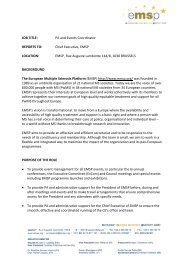Symptomatic Treatment of MS - European Multiple Sclerosis Platform
Symptomatic Treatment of MS - European Multiple Sclerosis Platform
Symptomatic Treatment of MS - European Multiple Sclerosis Platform
You also want an ePaper? Increase the reach of your titles
YUMPU automatically turns print PDFs into web optimized ePapers that Google loves.
DRUG TREATMENT<br />
So far donepezil and amantadine have been studied with respect to their effect on cognitive dysfunction.<br />
Moreover there are some data suggesting a slowing <strong>of</strong> cognitive decline during immunomodulatory<br />
treatment <strong>of</strong> <strong>MS</strong> with beta interferons and glatirameracetate.<br />
Donepezil, which is used for the treatment <strong>of</strong> Alzheimer type dementia, may ameliorate memory functions,<br />
especially verbal learning and memory, but also <strong>of</strong> alertness and executive functions (10 mg/d<br />
[Krupp 2004; Greene 2000]).<br />
In severely disabled <strong>MS</strong> patients, the amplitudes <strong>of</strong> cognitive evoked potentials could be improved with<br />
amantadine but reaction time measurements did not [Sailer 2000]; the clinical significance <strong>of</strong> these findings<br />
has to be determined [Geisler 1996].<br />
Beta interferons, glatirameracetate: During treatment with beta interferon 1b the visuospatial performance<br />
in treated patients was stable compared to deterioration <strong>of</strong> this task in patients on placebo [Pliskin<br />
1996]. Similar results have been achieved during interferon beta-1b treatment with respect to alertness,<br />
concentration, visual learning and recognition [Barak 2002]. On the contrary, another study using the<br />
same interferon in patients with relapsing-remitting <strong>MS</strong> failed to show any improvement <strong>of</strong> verbal<br />
memory [Selby 1998].<br />
In a post-hoc evaluation <strong>of</strong> a study using beta interferon-1a significant differences with respect to information<br />
processing, memory, visuospatial and executive functions could be demonstrated after two years<br />
<strong>of</strong> treatment compared to placebo [Fisher 2000].<br />
Studies using glatirameracetate [Weinstein 1999] or methotrexate [Goodkin 1992] could not detect any<br />
improvement or even stabilization <strong>of</strong> cognitive dysfunction.<br />
RECOMMENDATIONS<br />
� Patients and their family should be informed about cognitive dysfunction based on examples or<br />
situations <strong>of</strong> their daily life. This helps patients to become an active participant in the treatment<br />
process.<br />
� Training should be aimed specifically at the disturbed cognitive function(s) and the impact <strong>of</strong><br />
this/these on the handicap. High frequency treatment is mandatory.<br />
� Complex neuropsychological treatment is preferable, e.g. treatment <strong>of</strong> simultaneous depression,<br />
relaxation techniques, counselling within multimodal rehabilitation.<br />
� With immunomodulatory treatment cognitive decline may be delayed.<br />
27 E<strong>MS</strong>P, <strong>Symptomatic</strong> <strong>Treatment</strong> <strong>of</strong> <strong>Multiple</strong> <strong>Sclerosis</strong>, December 2006 - revised in April 2008






